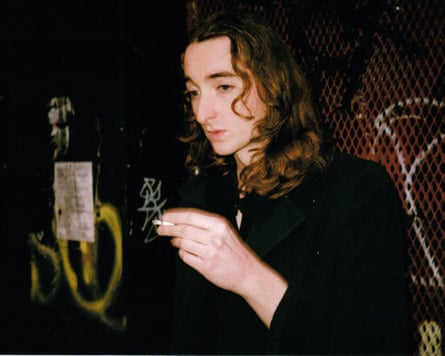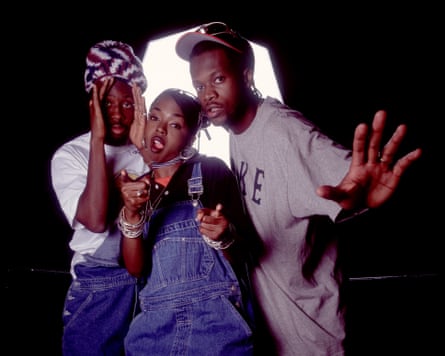The Brutalist is a big, muscular American epic that pits the individual against the machine; the artist against the cogs and wheels of commerce. It spins the tale of László Tóth, a Hungarian-born architect who’s beset on all sides, by capricious patrons, unreliable partners, mutinous contractors and an outraged general public. László is determined to make his masterpiece. His wife, though, is spooked by the psychological cost. “Promise you won’t let it drive you mad,” she says.
Architecture isn’t so different from independent film-making, says the film’s writer-director, Brady Corbet. It follows the same basic principles, throws up the same problems and provides similar levels of agony and ecstasy, and always more of the former. Corbet is now 36 years old and three movies into a gilded career. That makes him a success, a 21st-century Orson Welles. It’s just that each project takes its toll and, financially speaking, artists rarely if ever break even. “Eventually you start doing the math,” he explains. “And with every film it’s the same result. There are so many sacrifices you have to make along the way. And I can’t say for certain that it ever feels worth it.”
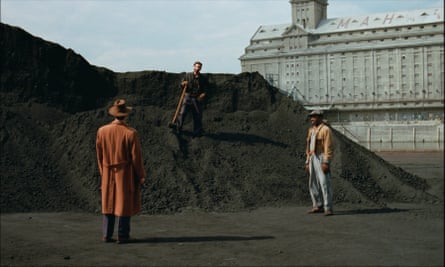
It’s a grey day in London but still too bright for comfort. Corbet is rumpled and fragile and won’t take off his shades. He explains that he’s jetlagged and was up half the night texting his wife, the Norwegian-born film-maker Mona Fastvold, who is back home in New York with their 10-year-old daughter. He lived with The Brutalist for seven years, finally got the thing done and now has to accompany it halfway around the world. Not that he’s complaining – it’s the best possible outcome. “But I’m so sick of this movie now. It’s like a teenager you just want to move out of the house. I love you dearly, but please, please, please leave me and mum alone.”
It serves him right for producing such a freak prodigy, outsized and free-swinging. The Brutalist clocks in at a whopping 215 minutes (including a 15-minute intermission) and was mostly shot on VistaVision, a defunct widescreen format last used in Hollywood on the 1963 Debbie Reynolds romcom My Six Loves. Premiering at the Venice film festival in September, Corbet’s picture rolled into town like the Rolling Stones on tour. The 70mm print came in 26 separate canisters and weighed a total of 300lbs.
The Brutalist, in short, is the sort of hubristic old-media folly that common sense tells us should never even get made, let alone be tipped for Oscar glory. Co-scripted with Fastvold, Corbet’s tale unfolds in a loquacious, unhurried fashion. But it drags us in, painting a portrait of a postwar United States born out of the embers of old Europe and fuelled by a supply of hungry, desperate refugees. Modernist architecture, the film suggests, is the other in our midst. It’s an alien interloper, like an immigrant or an artist. People are minded to hate it. Eventually, grudgingly, they come around.
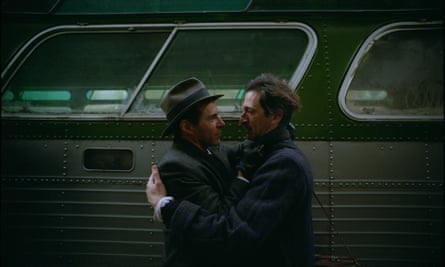
When Corbet was first set to shoot, several years ago, his film starred Joel Edgerton, Marion Cotillard and Mark Rylance. Then the $8m funding fell through, the principal roles were recast and the crew relocated to Hungary to capitalise on the tax breaks. Now it’s Adrien Brody who takes the lead as László, the Bauhaus-trained designer fleeing the Holocaust. Felicity Jones co-stars as his wife, Erzsébet, while Guy Pearce weaves in and out of the action as wealthy Harrison Lee Van Buren, who wants a monument built on a Pennsylvania hilltop. The relationship between the artist and his patron is fraught and precarious. Some days Van Buren regards László as his natural superior. But this then makes him resentful and liable to lash out. “You’re just a tramp,” he declares. “You’re a lady of the night.”
I suggest that Corbet sees himself as László, the harried master craftsman, and he freely admits that he does. But he sees himself in the artists from his other films, too. He identifies with 10-year-old Prescott, the nascent dictator from 2015’s The Childhood of a Leader. Also with Natalie Portman’s blasted pop diva in 2018’s Vox Luz. Corbet’s three features are so stylistically different. The first is a classical chamber piece, the second a glossy pop art explosion, the latest a sinewy 50s-set melodrama. What links them is their declamatory boldness of vision; a self-conscious abandon that seems to deliberately court disaster. The films are growing bigger. The stakes keep being raised. Sooner or later, something’s got to give.
“Brady’s films are divisive,” Guy Pearce tells me. “They’re never going to be everyone’s cup of tea.” Or, as Corbet puts it, they ride the line and risk becoming contemptible. That’s fine by him; it’s a badge of pride. He says: “If you’re not daring to suck, you’re not doing very much.”
Growing up in Colorado, the only child of a single mum, Corbet loved the films of Powell and Pressburger, Rainer Werner Fassbinder and Nicolas Roeg, film-makers who rolled the dice and flew in the face of good taste. He was a pint-sized cinephile, mainlining the classics the way other kids collected baseball cards. “Also a total completist,” he says. “If I saw a film from a director I liked I had to immediately see everything else that they’d done. It’s the same today. It’s the same with novelists. If I read something I like I always pray that the catalogue is not too long.” Otherwise, forget it: he’s buried in books for the next six months.
Acting provided a film school of sorts. As a kid, Corbet appeared as Evan Rachel Wood’s brother in Thirteen and Connie Britton’s son on 24. Mostly, though, he made a beeline for the directors he admired. Corbet was precocious and his strike-rate was uncanny. He became the baby-faced Zelig of auteurist leftfield cinema. Look, there he is as a traumatised teen in Gregg Araki’s Mysterious Skin, a bland wedding guest in Lars von Trier’s Melancholia, a simpering killer in Michael Haneke’s US remake of Funny Games. He had found his groove, one gig led to the next. But the pay wasn’t great and he struggled to get by.
People assume actors rake in millions, he says. “But when you’re working on an arthouse movie, you walk away with $15k gross and then you net maybe seven or eight. That’s not enough to live on. Also there wasn’t a high enough volume of projects to sustain me.” He scratches his beard.
There was another factor to consider. “I know actors who really love to perform. Even if the film itself isn’t great, they’re so focused on their little piece of it, their contribution, that they find it gratifying. And that wasn’t me. So I thought: ‘Maybe I’m not an actor’. I’d fallen into it at such a young age. And I was fine, I’d get by, but I was never as technically sound as the other performers I’d meet. They had talent and discipline. I always felt a little fraudulent.”
Eleven years back: 2013. That was the inflection point in his life. He’d fallen in love with Fastvold and they were writing films as a team. She’d recently made her first feature (The Sleepwalker, a home-invasion drama) and he was longing to do the same. So for 12 months he rattled from one screen role to the next – from Olivier Assayas’s Clouds of Sils Maria to Mia Hansen-Løve’s Eden to Noah Baumbach’s While We’re Young to Ruben Östlund’s Force Majeure – after which he went cold turkey and became a film-maker instead with The Childhood of a Leader, from a script that he had begun writing a decade before.
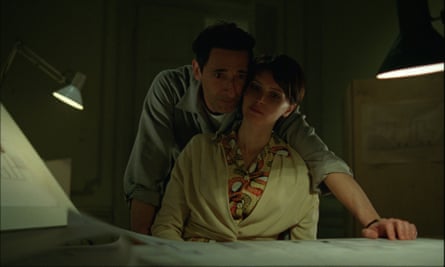
“What was psychotic is that I stopped performing the same year Mona got pregnant,” he recalls. “So I was abandoning my revenue stream when we needed it most. I mean, it wasn’t great but it was better than zero, which is what I then made for many, many years.” It was only when The Childhood of a Leader picked up the award for best debut at the Venice film festival that he dared to believe he’d made the right move after all.
after newsletter promotion
Money is art’s dirty secret, the tainted lifeblood of every large-scale production, be it a movie or a modernist palace on a hill. Corbet is a rarity in even wanting to discuss it. But poverty tends to be relative: it means different things to different people. So when he says zero, what does he actually mean? He must have earned something or he’d have withered and died.
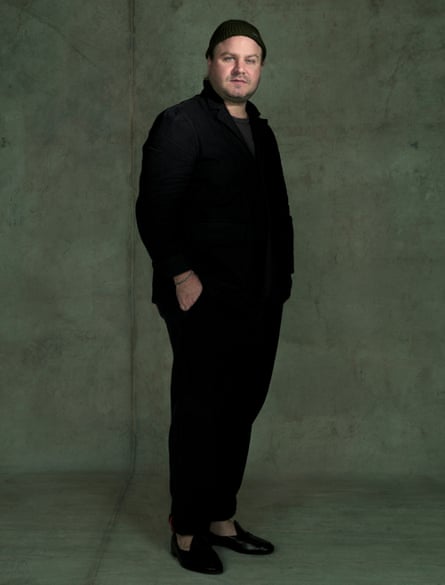
“OK,” he says. “So what we did, my wife and I, we started doing ghostwriting jobs. We’d write an entire screenplay for $15k, $20k, whatever we could get. Also we were staying in places where we weren’t paying rent. We stayed with Mona’s parents in Norway for a period of time.” He smiles. “So yeah, we swapped the champagne for some sparkling wine. But it felt like we were doing something dangerous at the time.”
Conceivably, they still are. The way Corbet tells it, his lifestyle hasn’t radically changed. He’s still short on cash and tends to view every film as a disaster in waiting. Never mind that The Brutalist premiered to rave reviews in Venice, where critics compared it to There Will Be Blood and Once Upon a Time in America. Never mind that it won Corbet the festival’s prize for best direction and was snapped up for distribution for a reported figure just short of $10m. I’m guessing the cash from this sale will eventually trickle through. “I don’t know yet,” he says. “I’ll be able to answer that question in, like, six to nine months.”
Guy Pearce’s advice is to put the money talk to one side. Pearce signed on to play Van Buren because he was thrilled by the script and loved Corbet’s style. He enjoyed making the film and is awed by the result. Financial success, he points out, won’t make The Brutalist any better. It’s still the same film whether it sparks or it bombs.
“What do we define as a successful film anyway?” Pearce says. “I’ve been perplexed in the past by films that are on everyone’s radar and have made a lot of money, and then when I see them, I really don’t get it. So it’s got to the point where I’ve tuned out of all that. I’m doing this selfishly – to express myself and for the experience. What happens to the film in the marketplace or in the world of awards, who cares, I’ve moved on.”
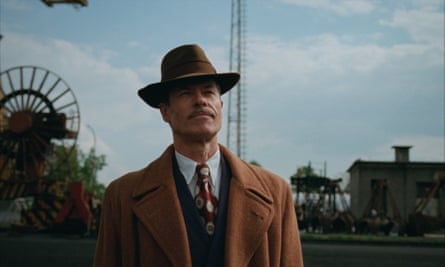
If Corbet isn’t rich, he can at least feel vindicated. The Brutalist could have been his Ozymandias: a colossal shattered wreck. Instead it’s being hailed as one of the year’s finest films. He stuck to his guns and proved the naysayers wrong. “I will not name names,” he says grimly. “But as recently as a couple of months ago, I had certain people telling me that I would never make another movie. So yes, absolutely, having the film heralded in this way is just great.”
Mentally, it seems, he has already moved on. He explains that his next film is going to be experimental, elemental. It’s going to be a film about the body; it’s designed to be rated NC17 [the strongest age rating given to films in the US]. Jetlag be damned, he’s now fired up, wide awake. He says: “You know what’s the really positive thing, the most enjoyable thing? It’s the relief that The Brutalist has bought me some time and that the next couple of years are now taken care of.” This is what counts as success in his world: permission to go through the whole ordeal again.
The Brutalist is in cinemas on 24 January.
Source: theguardian.com









